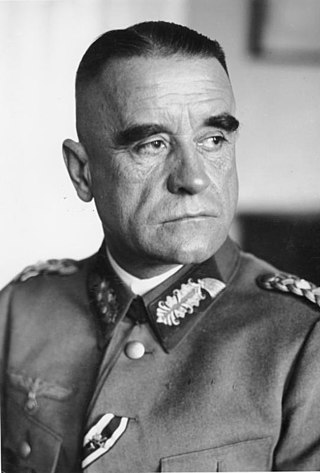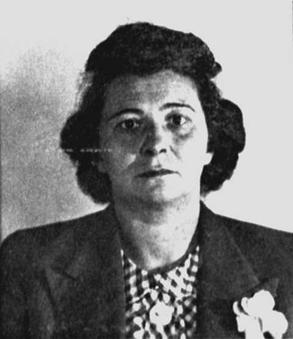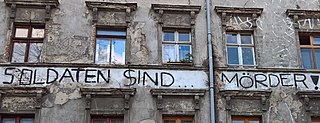Oberstleutnant is a senior field officer rank in several German-speaking and Scandinavian countries, equivalent to lieutenant colonel. It is currently used by both the ground and air forces of Austria, Germany, Switzerland, Denmark, and Norway. The Swedish rank överstelöjtnant is a direct translation, as is the Finnish rank everstiluutnantti.
Awards and decorations of Nazi Germany were military, political, and civilian decorations that were bestowed between 1923 and 1945, first by the Nazi Party and later the state of Nazi Germany.

Erich Knauf was a German journalist, writer, and songwriter. He was executed for making jokes about the Nazi regime.

Capital punishment in Germany has been abolished for all crimes, and is now explicitly prohibited by constitution. It was abolished in West Germany in 1949, in the Saarland in 1956, and East Germany in 1987. The last person executed in Germany was the East German Werner Teske, who was executed at Leipzig Prison in 1981.

German military law has a long history.

The Reichskriegsgericht was the highest military court in Germany between 1900 and 1945.

Walter Heitz was a German general (Generaloberst) in the Wehrmacht during World War II who served as President of the Reich Military Court and commanded part of the 6th Army in the Battle of Stalingrad.

The Awards and decorations of the German Armed Forces are decorations awarded by the German Bundeswehr, the German government, and other organizations to the German military and allied forces. Modern era German military awards have been presented since the establishment of the Federal Republic of Germany in 1949.
Befehlsnotstand is a German legal term that refers to a situation in which a certain action is ordered that violates law, but where the refusal to carry out such an order would lead to drastic consequences, specifically danger to life or body, for the person refusing to carry out the order.

Elli Hatschek was a member of the German Resistance against Nazism. She was married to Paul Hatschek, a leading member of the resistance group, the European Union and who was arrested by the Gestapo in 1943. Under heavy interrogation, he gave up the names of others in his group, who were then arrested. His wife was also arrested. Though she was not heavily involved, she was charged with "undermining the morale of the military" and was sentenced to death. She was executed by the Nazis at Plötzensee Prison.

Zersetzung was a psychological warfare technique used by the Ministry for State Security (Stasi) to repress political opponents in East Germany during the 1970s and 1980s. Zersetzung served to combat alleged and actual dissidents through covert means, using secret methods of abusive control and psychological manipulation to prevent anti-government activities. People were commonly targeted on a pre-emptive and preventive basis, to limit or stop activities of dissent that they may have gone on to perform, and not on the basis of crimes they had actually committed. Zersetzung methods were designed to break down, undermine, and paralyze people behind "a facade of social normality" in a form of "silent repression".
Kurt Fuchs was an Austrian soldier in the German Wehrmacht during World War II who deserted. He was executed by a firing squad in Vienna barely a month before the Vienna fell to the Vienna offensive of the Red Army.

Wolfram Wette is a German military historian and peace researcher. He is an author or editor of over 40 books on the history of Nazi Germany, including the seminal Germany and the Second World War series from the German Military History Research Office (MGFA).
Rosa Hofmann was an Austrian Communist Youth leader who became a resistance activist during the 1930s. In 1943, she was arrested and taken to Berlin where she faced trial, conviction and execution.

The Crete Cuff Title, or Crete Cuff Band, was a World War II German military decoration awarded to Wehrmacht servicemen who took part in the battle of Crete between 20 and 27 May 1941.

The Africa Cuff Title, or Africa Cuff Band, was a World War II German military decoration awarded to members of the Wehrmacht who took part in the North African campaign of 1941–43.
The Metz 1944 Cuff Title, or Metz 1944 Cuff Band, was a World War II German military decoration instituted to reward members of the Wehrmacht who took part in the 1944 battle of Metz.

The Courland Cuff Title, or Courland Cuff Band, was a World War II German military decoration awarded to Wehrmacht servicemen of Army Group Courland who served in the Courland Pocket.

The Warsaw Shield,, or Warsaw Arm Shield, was a planned World War II German military decoration intended for award to Wehrmacht and Waffen-SS servicemen who took part in the suppression of the 1944 Warsaw uprising. Although authorised, with the conditions of award and the design approved and announced, production had not begun prior to the end of the war and the award was never issued.

"Soldiers are murderers" is a quote from an opinion piece written in 1931 by Kurt Tucholsky and published under his pseudonym Ignaz Wrobel in the weekly German magazine Die Weltbühne. Starting with a lawsuit against the magazine's editor Carl von Ossietzky for "defamation of the Reichswehr" in 1932, Tucholsky's widely quoted assertion led to numerous judicial proceedings in Germany, also after World War II and until the late 20th century. In several cases in the 1990s, last in 1995, the Federal Constitutional Court ruled that using the quote as a means to express pacifist views is protected by the constitution of Germany.















